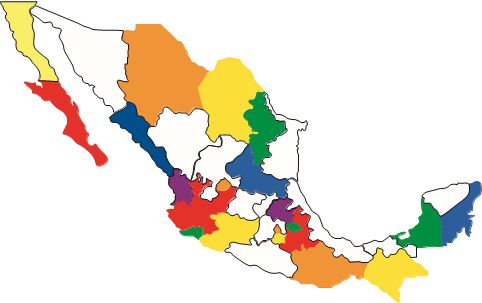In Mexico, 53% of the people surveyed by Encuesta Nacional de Discriminación por Orientación Sexual e Identidad de Género ("ENDOSIG") mentioned that they have been a victim of harassment, hate speech and physical attacks due to their sexual orientation. Also, 60% of the people surveyed mentioned that they felt discriminated for their physical appearance, manner of speaking or other gender expressions at least once over the last year. Additionally, data from ENDOSIG found that at least 7 out of 10 individuals prefer to hide their sexual orientation or gender identity out of fear of being discriminated1.
Additionally, data from ENDOSIG indicates that 25.3% of the people surveyed have been denied access to medical care, provision of public services, business facilities, education, financial products, justice or labor opportunities for reasons related to their sexual orientation. Furthermore, 7 out of 10 LGBTQIA+ individuals stated that they have felt discriminated against regarding educational positions and half said they have experienced, at least once, situations of harassment, bullying or discrimination at work.2 Also, 1 out of 3 complaints submitted at Consejo Nacional para Prevenir la Discriminación ("CONAPRED") is related to discrimination in the workplace while 14% refer to cases of discrimination in the provision of public services. This provides for a simple conclusion: Constitutional rights for all Mexicans to be treated with dignity, to work and to a life free of violence are not complied with in Mexico regarding sexual orientation discrimination.
In light of this data, this article provides simple overview of advancements regarding legal inclusion of LGBTQIA+ community and highlight the importance of inclusive economic development.
Legal LGBTQIA+ inclusivity in Mexico
Legal inclusion regarding same sex-marriage and adoption as well as transgender rights diverge among States in Mexico. In 2015, Suprema Corte de Justicia de la Nación ("SCJN") ruled that there is no constitutional principle to not recognize same sex marriages3. However, same-sex couples continue facing challenges as States have different legislation regarding marriage and civil registries that continue to reject applications for same-sex marriages. Likewise, over the last few years the SCJN has issued binding judicial precedents on all courts securing adoption rights for same-sex couples nationwide and transgender rights4.
Hereunder is a map representing with rainbow colors the States with the highest inclusion of LGBTQIA+ rights in local laws. Nevertheless, local legislatures of the States represented in white on the map have not made the necessary legislative reforms to recognize either same-sex marriage, adoption or transgender rights. Regarding the States in white, there are legal precedents through which a juicio de amparo (constitutional appeal), individuals are able to obtain access to same sex marriage, adoption and transgender rights. Nevertheless, such legal procedure is costly and time consuming5 and provides for a de facto barrier to inclusion regarding LGBTQIA+.

Clearly, legislative reforms are required to improve legal LGBTQIA+ inclusivity in order to: (i) treat same-sex couples on an equal footing regarding different-sex couples access to marriage, adoption and assisted reproductive technology and (ii) allow transgender individuals to modify their gender marker in the civil registry throughout the country6.
Challenges regarding economic development of the LGBTQIA+ community
Academic research shows that exclusion of LGBTQIA+ individuals produces negative effects to the economy of a country. Exclusionary treatment in any economy provides for loss of labor time and loss of productivity, underinvestment in human capital and inefficient allocation of human resources through discriminating hiring practices7. These are factors that do not provide for a healthy social and economic environment.
In Mexico, employment discrimination based on sexual orientation is prohibited under article 1 and 9 of the Ley Federal para Prevenir y Eliminar la Discriminación (Federal Law to Prevent and Eliminate Discrimination). Such law also prohibits discrimination regarding physical, sexual, psychological, property-related or economic violence on the basis of sexual preference.
In Mexico the LGBTQIA+ community continues to face challenges regarding wage discrimination, lack of career advancement and restricted access to financial products. In order to tackle issues regarding labor inclusion, the Norma Mexicana en Igualdad Laboral y No Discriminación (Mexican Standard on Labor Equality and Non-Discrimination) acknowledges workplaces that have practices on labor equality and non-discrimination, including those focused on LGBTQIA+ people.
Regarding financial inclusion, different financial institutions in the private sector have developed policies to promote LGBTQIA+ inclusion. For instance, some fintechs in Mexico have created credit products targeted to LGBTQIA+ community or allow individuals to choose their preferred name and gender on credit and debit cards.
Conclusions
Over the last few years significant advancements in legal and economic inclusion for the LGBTQIA+ community have been made. However, discrimination in the labor market, services, and public spaces in Mexico prevails. Legislative reforms are required to improve legal LGBTQIA+ inclusivity throughout States in Mexico, in order for LGBTQIA+ to have access to civil rights like marriage, adoption, assisted reproductive technology and gender recognition nationwide.8
As part of our Pride Month activities, Hogan Lovells believes in taking steps forward to support LGBTQIA+ community and their rights is crucial to promote development. We are convinced that tackling sexual orientation discrimination will have a positive impact in multiple aspects of LGBTQIA+ community, that will push for the betterment of the Mexican economy as a whole.
Footnotes
1.Conapred (2018). Encuesta Nacional de Discriminación por orientación Sexual e Identidad de Género. Retrieved from. https://www.conapred.org.mx/userfiles/files/Presentacioon_ENDOSIG_16_05_2019.pdf
2. Comisión Ejecutiva de Atención a Víctimas y Fundación Arcoiris. (2016). Investigación sobre atención a personas LGBT en México: Resumen Ejecutivo. Retrieved from https://goo.gl/beZHLP
3. Matrimonio entre personas del mismo sexo. No existe razón de índole constitucional para no reconocerlo. Jurisprudencia. Amparo en revision. Primera Sala. Clave 1a./J. 46/2015 (10a.) (SJF: 10a época, T I, Junio, 2015, p. 534). Disponible en línea: SCJN (https://sjf2.scjn.gob.mx/detalle/tesis/2009406) Registro 2009406. (Consulta: Junio 16, 2021).
4. Derecho a la vida familiar de las parejas del mismo sexo. Jurisprudencia. Amparo en Revisión. Primera Sala. Clave 1a./J. 8/2017 (10a.) (SJF: 10a época, T I, Enero, 2017, p. 127). Disponible en línea: (https://sjf2.scjn.gob.mx/detalle/tesis/2013531) Registro 2013531. (Consulta: Junio 16, 2021).
Adopción. El interés superior del menor de edad se basa en la idoneidad de los adoptantes, dentro del cual son irrelevantes el tipo de familia al que aquél sea integrado, así como la orientación sexual o el estado civil de éstos. Jurisprudencia. Acción de Inconstitucionalidad. Pleno. Clave P.J 8/2016 (10a.) (SJF: 10a época, T I, Sept., 2016, p. 6). Disponible en línea: (https://sjf2.scjn.gob.mx/detalle/tesis/2012587) Registro 2012587. (Consulta: Junio 16, 2021).
Reasignación sexo-genérica. La vía administrativa registral es la idónea para la adecuación o expedición de las actas de nacimiento por ese motivo (Legislación de los Estados de Chihuahua y Guanajuato). Jurisprudencia. Contradicción de Tesis. Segunda Sala. Clave 2a./J. 173/2018 (10a.). (SJF: 10a época, T I, Feb., 2020, p. 894). Disponible en línea: SCJN (https://sjf2.scjn.gob.mx/detalle/tesis/2021582) Registro 2021582. (Consulta: Junio 16, 2021).
5. States with different colours have local laws that allow access to either same-sex marriage, adoption or transgender rights. On the contrary, States in white do not allow for same-sex marriage, adoption or transgender rights.
6. OECD (2020). Over the rainbow. The road to LGBTI inclusion. Retrieved from https://www.oecd.org/mexico/OECD-LGBTI-2020-Over-The-Rainbow-MEXICO.pdf
7. Lee Badgett, Kees Waaldijk, Yana van der Meulen Rodgers. (2019). The relationship between LGBT inclusion and economic development: Macro-level evidence, World Development, Volume 120, Pages 1-14. Retrieved from https://www.sciencedirect.com/science/article/pii/S0305750X19300695
8. OECD (2020). Over the rainbow. The road to LGBTI inclusion. Retrieved from https://www.oecd.org/mexico/OECD-LGBTI-2020-Over-The-Rainbow-MEXICO.pdf
The content of this article is intended to provide a general guide to the subject matter. Specialist advice should be sought about your specific circumstances.


